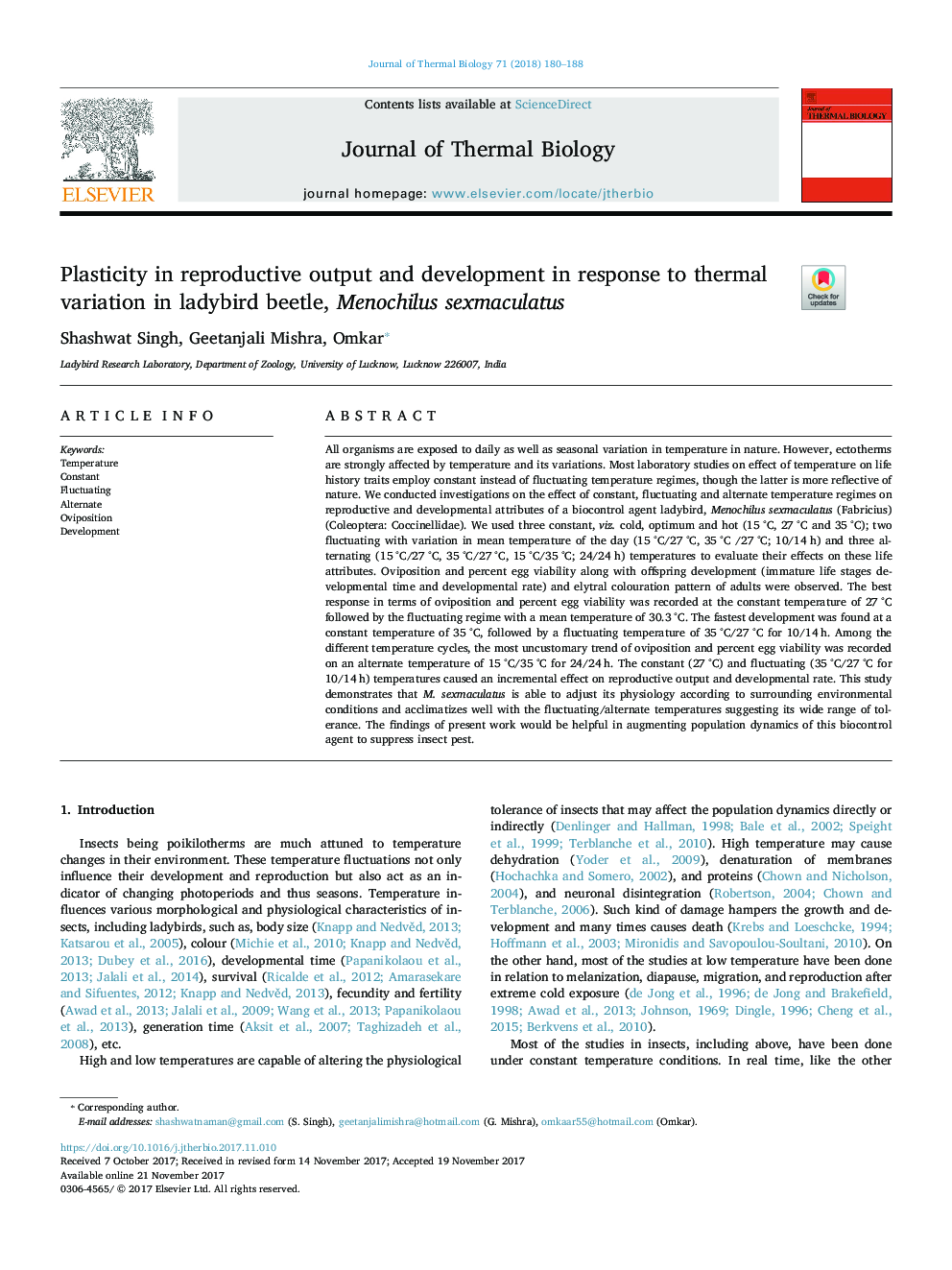| کد مقاله | کد نشریه | سال انتشار | مقاله انگلیسی | نسخه تمام متن |
|---|---|---|---|---|
| 8650148 | 1571076 | 2018 | 9 صفحه PDF | دانلود رایگان |
عنوان انگلیسی مقاله ISI
Plasticity in reproductive output and development in response to thermal variation in ladybird beetle, Menochilus sexmaculatus
دانلود مقاله + سفارش ترجمه
دانلود مقاله ISI انگلیسی
رایگان برای ایرانیان
کلمات کلیدی
موضوعات مرتبط
علوم زیستی و بیوفناوری
علوم کشاورزی و بیولوژیک
علوم کشاورزی و بیولوژیک (عمومی)
پیش نمایش صفحه اول مقاله

چکیده انگلیسی
All organisms are exposed to daily as well as seasonal variation in temperature in nature. However, ectotherms are strongly affected by temperature and its variations. Most laboratory studies on effect of temperature on life history traits employ constant instead of fluctuating temperature regimes, though the latter is more reflective of nature. We conducted investigations on the effect of constant, fluctuating and alternate temperature regimes on reproductive and developmental attributes of a biocontrol agent ladybird, Menochilus sexmaculatus (Fabricius) (Coleoptera: Coccinellidae). We used three constant, viz. cold, optimum and hot (15 °C, 27 °C and 35 °C); two fluctuating with variation in mean temperature of the day (15 °C/27 °C, 35 °C /27 °C; 10/14 h) and three alternating (15 °C/27 °C, 35 °C/27 °C, 15 °C/35 °C; 24/24 h) temperatures to evaluate their effects on these life attributes. Oviposition and percent egg viability along with offspring development (immature life stages developmental time and developmental rate) and elytral colouration pattern of adults were observed. The best response in terms of oviposition and percent egg viability was recorded at the constant temperature of 27 °C followed by the fluctuating regime with a mean temperature of 30.3 °C. The fastest development was found at a constant temperature of 35 °C, followed by a fluctuating temperature of 35 °C/27 °C for 10/14 h. Among the different temperature cycles, the most uncustomary trend of oviposition and percent egg viability was recorded on an alternate temperature of 15 °C/35 °C for 24/24 h. The constant (27 °C) and fluctuating (35 °C/27 °C for 10/14 h) temperatures caused an incremental effect on reproductive output and developmental rate. This study demonstrates that M. sexmaculatus is able to adjust its physiology according to surrounding environmental conditions and acclimatizes well with the fluctuating/alternate temperatures suggesting its wide range of tolerance. The findings of present work would be helpful in augmenting population dynamics of this biocontrol agent to suppress insect pest.
ناشر
Database: Elsevier - ScienceDirect (ساینس دایرکت)
Journal: Journal of Thermal Biology - Volume 71, January 2018, Pages 180-188
Journal: Journal of Thermal Biology - Volume 71, January 2018, Pages 180-188
نویسندگان
Shashwat Singh, Geetanjali Mishra, Omkar Omkar,